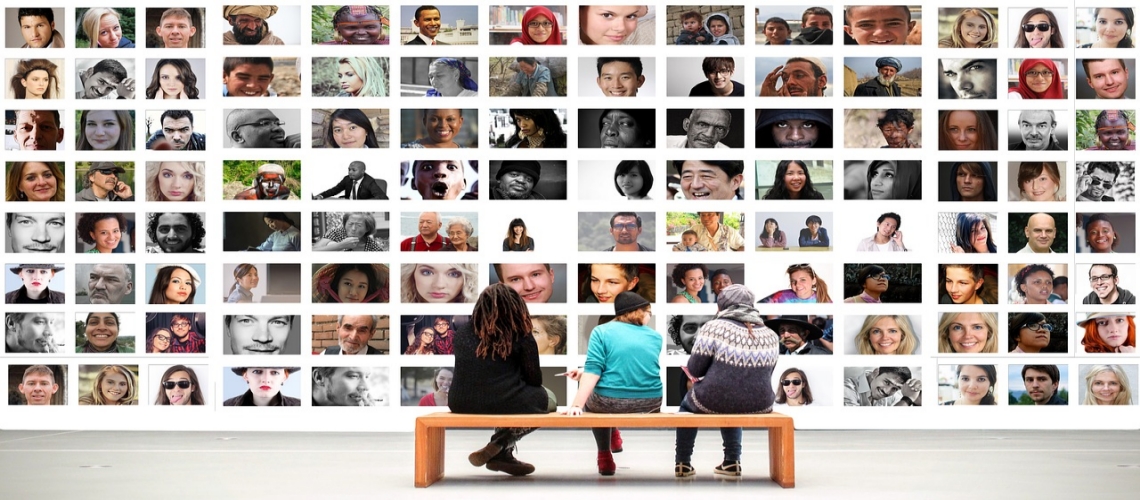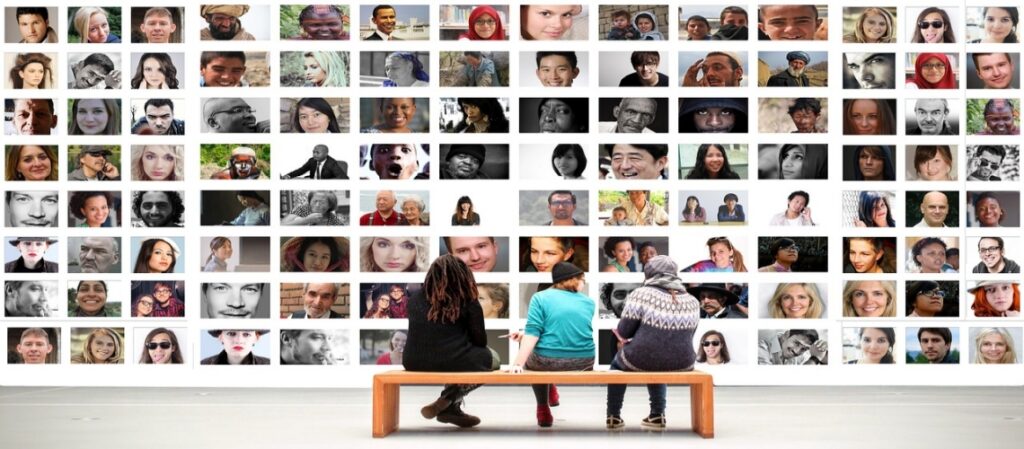Diversity, Sensitivity and Censorship
A.P. Atkinson
One of the most divisive topics of our time, thanks to an incredibly irresponsible mainstream media, is that of diversity. People have become literally afraid to express themselves out of fear of offending people, or perhaps more specifically, of offending the wrong people. Certain words and opinions have become increasingly taboo as we’re constantly dictated to on what we must and must not think and say.

You only need to look at the various writing forums to see a lot of new authors seeking answers as they begin writing their first novels. Should they include different races? Are they obliged to accommodate different ideologies? Must different sexual orientations be evenly represented?
The simple answer to all of these questions is ‘no’. All of this nonsense is best ignored; allow me to explain…
There is absolutely nothing wrong with the principle of inclusivity. I doubt anybody reading this believes that people who were born different have a lesser right to be included. But, by that same logic, nobody should have a greater right to be included either. If someone was born without arms, we probably wouldn’t invite them for a game of tennis, for example. It’s very important we apply some common sense to the situation, and in doing so, the muddied waters of the modern world start to clear all by themselves.
When it comes to publishing, it’s important to keep in mind that we’re leaving behind a record of who we were. We are adding to the historical record of the human race and we shouldn’t cheapen it by only highlighting certain things that we identify with. The right to be published should absolutely be open to everyone equally, even if much of it is not worth reading.
And that should be the end of it. Once we resort to filling diversity quotas, it never ends well, as anyone reading this probably already knows. Quotas always lead to the juking of stats, prioritising the numbers on the page at the expense of the real world outcome, and everything just gets worse as a result.
Certain ideologies are now so wildly out of control that it’s almost impossible to question any aspect of them without being labelled an oppressor, even though the belief structure is by definition oppressive, and crumbles like a house of cards upon scrutiny. These perspectives are trendy, shift like patterns in the sand, and has no place intruding on the world of art and expression.
As an independent artist, nobody has the right to dictate the content of your work. It’s your job and yours alone to carefully examine all sides of an issue and present a reasoned, intelligent story that takes a serious and critical look at the topics that interest you. That doesn’t mean that you should simply accept what people around you are saying, but neither does it mean the opposite.
One of the ironies of the human condition is that things now considered shallow were once thought of as common sense, learned through generations of experience and hard earned wisdom. In many cases, we’ve simply forgotten. Other times, that they belong in the past, like humans were any different then. Typically such lessons are often badly misunderstood, and in actuality make considerably more sense than the arguments against them.
For example, there’s the old adage that you shouldn’t judge a book by its cover. If that were the case, then why do we have book covers? We all know that people absolutely do make judgements based on first impressions. We know that, and we have no choice but to accept that it is just human nature.
Likewise, if someone is clearly overweight, we make assumptions about them. The current trend that’s being promoted these days is to not judge, to accept their lifestyle choice and not to assume they’re unhealthy. Some go even further and insist that they are even more healthy, and that they are beautiful.
And yet we all know that’s incredibly naive. People gain weight because of the choices they make, and we can absolutely make reasonable judgements about that person based on this.
Should we judge a man for being short, or bald, or by the colour of his skin? Absolutely not. Should we make assumptions about a man dressed like the criminals in the latest movies, shouting at bystanders, and whistling at passing women? Of course we can. It’s absolutely right and reasonable that we make cursory judgements about a person based on the choices they’ve made and the way they present themselves to the world.
And, sadly, a lot of the other things we’re told make equally little sense.
When it comes to diversity, the choice to include or to leave out is yours, and belongs to nobody else. Put the people in the story that need to be in the story. Leave out whatever characters you don’t feel are appropriate.
There’s also a growing trend towards tokenism. That’s where a minority element is shoehorned into a story just for the sake of having them represented. The problem with this is that’s it’s just as offensive to the people you’re trying to represent, as entirely leaving them out. Forty years ago, minority groups complained that there was too much tokenism on TV. Now, these same groups are saying there isn’t enough. You cannot win if you try to accommodate such demands.

In Hollywood, the long running trend was to insert occasional black characters into a group. Nowadays, it’s more commonly seen with a gay character. Gay people only make up around two percent of the population, so unless your story specifically deals with gay issues, or has at least 50 unique characters, it’s far less likely that they would be included by accident.
And assuming we did put one in, how is it not offensive to do so solely on the basis that they’re gay? Often, these characters have no other defining characteristics than that they represent diversity.
Having characters that belong to a minority group is of course not an issue, provided they be a character first, and a minority second. Including two-dimensional characters solely as a means to signal to your audience how inclusive you are is frankly insulting. When you do that, you’re not being inclusive, you’re being exploitative.
Sensitivity is a whole different subject. How sensitive should you be when you deal with difficult issues. Well, the answer is that you should be as sensitive as the subject demands, and not as sensitive as the vocal minority insists, out of fear it might offend them.
Take the story of The Little Mermaid. In the original story, the mermaid dies at the end. She turns into a mass of sea foam. In the Disney version, they made it much more family friendly. But was it really more friendly to families?
When you change an ancient story to modernise it, the meaning, and often much of its value, is lost. The original story was about identity, about being true to your origins and learning to accept who you are. When she tried to live in a world she wasn’t born into, she lost her identity and ceased to exist. If we take out the consequences, the story loses its stakes, and the drama vanishes. The lesson the story was trying to teach is gone.
It’s the same with sensitivity. We now live in an environment where illogical viewpoints are accepted without question and debate is not permitted, because it may cause offence.
Well, offence is good for you. Nobody walks through life without being offended. If I wear a red hat and you don’t like red, whose problem is it? It’s not mine, because my bald head is still being shielded from the sun. The problem is with the person who has taken offence, and is therefore not mine to deal with.
Adults take offence all the time, and simply shrug it off. Only children have tantrums when someone has said something they don’t like. We should not encourage this in grown-ups. All we end up doing is enabling a very negative and immature behaviour that is bordering on mental illness.
Offence is a way of checking and measuring our attitudes. You see, nobody is offended by what we know is true. If I was to say to you that the sun wouldn’t come up tomorrow morning, would you be offended by that? Of course not. You’d laugh, presume I needed to wear a better hat and should stay out of the sun a little more.
But, if I was to say to a devoutly religious person that their god is a fictitious creation of their own imagination, they would likely become quite angry about that. But that’s not a reason not to say it. Their anger is because they lack conviction. They’re not quite sure themselves, and when other people question it, it weakens their own belief in the validity of what they’ve accepted.
This is extremely beneficial to us as people. If we’re offended, the correct response is to introspect, and question whether or not we’re actually right, and if perhaps we need to change.

Can you imagine what the world would be like right now if you were able to say whatever you thought was correct and reasonable, and the expected response would be people nodding, and thinking about what you said, instead of getting angry?
Of course, there are some topics that require a degree of sensitivity. If your subject is death and mortality, especially if it’s about a child, care should be taken as it’s a very raw topic for a great many people. But this must be out of courtesy and respect, not fear. There is a gulf of difference, and we all understand what it is.
And finally, we come to censorship.
The big question these days is what to avoid talking about in stories. There are whole groups of topics that people avoid, and this is a very dangerous direction because that group of topics is getting larger by the day. There are certain things that used to be considered science, that were absolutely enshrined in fact, but are now taboo because some people are uncomfortable facing the truth.
You should never censor yourself, and never censor your characters. It’s death to a story, and the audience will lose interest quickly in the bland and uninteresting ideas that are introduced. Even Hollywood is waking up to this fact now, as they slowly go broke from making such terrible pandering movies.
I have faced this issue myself, as all authors have. I have a story involving a main character who has mental health issues and makes many overtly questionable decisions. I actively considered reigning him in, but came to the conclusion that if I did, I’d be censoring my story and selling both my audience, and myself short.
I decided it was easier to live with myself knowing I had expressed the story with honesty and integrity.
Do I include a diverse cast of characters? It entirely depends on the story. I have included an openly gay character, because doing so made sense to the plot. I’ve included White, Black and Asian characters, where I felt it was appropriate to add them. I sometimes write from a female perspective, and I even once wrote a very well-received feminist article, under a different name, for a client.
It doesn’t matter to me because I write characters. Not all women are one way, no more than all men are. Everyone is a little bit different and it takes all of those differences to make a world work.
So when you write, write out of respect. Treat your characters like real people, and treat your audience like you’re across from them at a table. Never write out of fear, or to gain points in an argument. J.K. Rowling hasn’t learned that lesson yet, and keeps on making herself look worse and worse every time she opens her mouth. Learn from her mistakes.
Never censor yourself, or let other people tell you what you’re allowed to say. If you give in to that even for a moment, they’ll make more demands next time. You can never satisfy people like that because they’re not interested in the result, it’s simply a power grab. They want power over you, and the more they get, the more they want. The only way to win that game is not to play it. Anyone with children will understand exactly what that’s like. If you give in, they demand more and you end up raising spoilt, lazy, insecure and weak children, which is the behaviour of the vocal minority right now.
Include the characters that fit your story. Don’t force in things that don’t fit, because your audience will see right through it and you’ll lose their respect. Equally, don’t exclude characters because or your own prejudices. Learn the truth about the people you’re writing, and your prejudices will often melt away.
In a writing class I once used an example to make a point. Humans are ninety nine percent the same as a chimpanzee. Only one percent separates us from a hairy, smelly creature that finds its own poop fascinating.
If that’s true, then how different can humans actually be from each other? The truth is we’re not that different, and it’s not that difficult to create believable characters, so long as you take the time to get to know how people really are, how they think and behave. But people aren’t White, Black, male, female, gay or straight. They’re individuals, made up from a varied mix of personality and character elements that make them unique. If you can write with that in mind, there will be nothing for anyone to moan about.
Of course, that is unlikely to stop them, but at least you know you’ve created something you can be proud of, not pandered to people who only want to stamp you down.
Many thanks for reading this article. We hope it was interesting, informative and entertaining. Follow us on social media or share our content on your own pages. It helps us grow so we can create more free content to help you.

It’s funny because the loud minority and the media makes you think there’s one opinion, but I listen to the common man. I hear the same thing from every single one. They hate tokenism. I call it “diversity bingo”. Theu actually have far less of a problem with things labeled as “racist” and other things. Dumbo? The crows that has everyone all “racism! racism!” are the same crows that Whoopie Goldberg, a black woman, said she actually wanted to see MORE of on merchandise because they sang the most important song in the movie. In her opinion anyway. She saw nothing wrong with them. When a black woman is saying she actually LIKES something that the loud ones say is racist, it’s definitely time to re-examine who is saying it and why. It’s been the same with 007. A black woman? The people I’ve talked to don’t want a black “Jane Bond”. They want 009. An original character that is their own. Not a borrowed one. They don’t want to see more black Captain Americas. They want more Black Panthers. They actually are almost always AGAINST gender and race swapping, and they’re the gender/race that’s being swapped to. LGBTQ is no different. Some have even said they’d rather NOT be represented because they know they’re just there to check a box on diversity bingo.
This whole thing makes me ache for new authors. I’m lucky that I’m grounded enough to stand firm in my story and no longer care about diversity bingo and the like. But I had to work to get there in much better times. I can’t imagine how many good books and good authors we’ve lost to this current insanity.